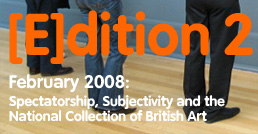
Image/Sound/Text
Dana Mendonca
Since coming to Tate Britain I have been thinking about what Britishness means to me; whether or not I can truly claim that I am British. I have dual nationality and find it impossible to find the boundary where my nationalities meet. I left Slovakia when I was 19 and my everyday conduct is still influenced by my upbringing and the culture I grew up in. Eleven years later, I still keep some of our main traditions like celebrating Christmas on Christmas Eve or celebrating name-days. Name-days are similar to birthdays. All calendars in Slovakia have different names allocated to every date of the year. My name-day is the 16th of April. My husband had no trouble with accepting this tradition; on the contrary, we found a name-day for him too.
We spent this Christmas (the 24th of December) with our friends. Nationality wise, it was a mixed company. Seven of us were from Slovakia, one Czech, one Egyptian, one Turkish, one from Iran and then my husband Charlie, whose parents came here over 30 years ago from Madeira. We had fish, which is the Slovak equivalent of turkey, but also a great deal of non-traditional food. Then on Christmas Day, I celebrated Christmas again with my husband’s family. What I am trying to say here is that perhaps we should not rigidly stick to traditions we grew up with, we should be open to new practices, adapt our old traditions to fit in with our new lives. I am not at all worried that I will forget who I am if I do not keep my Slovak traditions. In today’s globalised world all cultures influence each other. Some things might be lost in the process, but as long as we keep what is important to us this is a change for the better. Especially since some traditions were put in place in order to control certain groups and classes in society.
I do not think that my national identity depends on traditions alone. I can call myself British without disputing the fact that I am also Slovakian. This is due to the fact that the term British has a very broad meaning in my mind. It is not like calling myself English, Scottish, Irish or Welsh. I could certainly not fit my self in any of these categories. I see myself in a different group. I imagine my group full of people that came to live in this country but cannot fully identify themselves with, for example, English people. In my group there are people from all around the world, proud to be British, but whose national identities were in part formed away from their new home. The United Kingdom in my mind has gained a new fictional home country, one that is not defined by geographical boundaries. This home country is defined by the capacity of true Brits to accept newcomers and the capacity of newcomers to integrate.
I often get asked where I am from and to be honest I struggle to answer accurately. I could say: “Originally I am from Slovakia, …well, for most of my childhood it was Czechoslovakia… but I equally consider myself being from Britain because this has been my home for over a decade.” I do think however that this answer would confuse most people. The most accurate answer, which is as confusing is: “I am from the new, made-up home country of the UK…I call it Home.”

